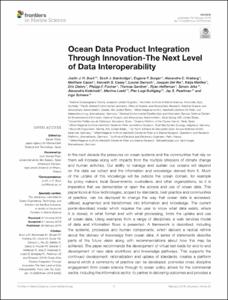| dc.contributor.author | Buck, Justin J. H. | |
| dc.contributor.author | Bainbridge, Scott J. | |
| dc.contributor.author | Burger, Eugene F. | |
| dc.contributor.author | Kraberg, Alexandra C. | |
| dc.contributor.author | Casari, Matthew | |
| dc.contributor.author | Casey, Kenneth S. | |
| dc.contributor.author | Darroch, Louise | |
| dc.contributor.author | Del Rio, Joaquin | |
| dc.contributor.author | Metfies, Katja | |
| dc.contributor.author | Delory, Eric | |
| dc.contributor.author | Fischer, Philipp F. | |
| dc.contributor.author | Gardner, Thomas | |
| dc.contributor.author | Heffernan, Ryan | |
| dc.contributor.author | Jirka, Simon | |
| dc.contributor.author | Kokkinaki, Alexandra | |
| dc.contributor.author | Loebl, Martina | |
| dc.contributor.author | Buttigieg, Pier Luigi | |
| dc.contributor.author | Pearlman, Jay S. | |
| dc.contributor.author | Schewe, Ingo | |
| dc.date.accessioned | 2021-12-15T18:34:54Z | |
| dc.date.available | 2021-12-15T18:34:54Z | |
| dc.date.issued | 2019 | |
| dc.identifier.citation | Buck, J.J.H., Bainbridge, S.J., Burger, E.F.,
Kraberg, A.C., Casari, M., et al
(2019) Ocean Data
Product Integration Through
Innovation-The Next Level of Data
Interoperability. Frontiers in Marine Science, 6:32, 19pp.
DOI: 10.3389/fmars.2019.00032 | en_US |
| dc.identifier.uri | https://repository.oceanbestpractices.org/handle/11329/1811 | |
| dc.description.abstract | In the next decade the pressures on ocean systems and the communities that rely on
them will increase along with impacts from the multiple stressors of climate change
and human activities. Our ability to manage and sustain our oceans will depend
on the data we collect and the information and knowledge derived from it. Much
of the uptake of this knowledge will be outside the ocean domain, for example
by policy makers, local Governments, custodians, and other organizations, so it is
imperative that we democratize or open the access and use of ocean data. This
paper looks at how technologies, scoped by standards, best practice and communities
of practice, can be deployed to change the way that ocean data is accessed,
utilized, augmented and transformed into information and knowledge. The current
portal-download model which requires the user to know what data exists, where
it is stored, in what format and with what processing, limits the uptake and use
of ocean data. Using examples from a range of disciplines, a web services model
of data and information flows is presented. A framework is described, including
the systems, processes and human components, which delivers a radical rethink
about the delivery of knowledge from ocean data. A series of statements describe
parts of the future vision along with recommendations about how this may be
achieved. The paper recommends the development of virtual test-beds for end-to-end
development of new data workflows and knowledge pathways. This supports the
continued development, rationalization and uptake of standards, creates a platform
around which a community of practice can be developed, promotes cross discipline
engagement from ocean science through to ocean policy, allows for the commercial
sector, including the informatics sector, to partner in delivering outcomes and provides a
focus to leverage long term sustained funding. The next 10 years will be “make or break”
for many ocean systems. The decadal challenge is to develop the governance and cooperative
mechanisms to harness emerging information technology to deliver on the goal
of generating the information and knowledge required to sustain oceans into the future. | en_US |
| dc.description.sponsorship | AtlantOS | |
| dc.description.sponsorship | European Union | |
| dc.description.sponsorship | AtlantOS | |
| dc.language.iso | en | en_US |
| dc.rights | Attribution 4.0 International | * |
| dc.rights.uri | http://creativecommons.org/licenses/by/4.0/ | * |
| dc.subject.other | Data standards | en_US |
| dc.subject.other | Data democratization | en_US |
| dc.subject.other | End user engagement | en_US |
| dc.subject.other | Data innovation | en_US |
| dc.subject.other | Data integrity | en_US |
| dc.title | Ocean Data Product Integration Through Innovation-The Next Level of Data Interoperability. | en_US |
| dc.type | Journal Contribution | en_US |
| dc.description.refereed | Refereed | en_US |
| dc.format.pagerange | 19pp. | en_US |
| dc.identifier.doi | 10.3389/fmars.2019.00032 | |
| dc.subject.dmProcesses | Data management planning and strategy development | en_US |
| dc.bibliographicCitation.title | Frontiers in Marine Science | en_US |
| dc.bibliographicCitation.volume | 6 | en_US |
| dc.bibliographicCitation.issue | Article 32 | en_US |
| dc.description.sdg | 14.a | en_US |
| dc.description.eov | N/A | en_US |
| dc.description.adoption | Novel (no adoption outside originators) | en_US |
| dc.description.methodologyType | Specification of criteria | en_US |
| obps.contact.contactname | Justin J. H. Buck | |
| obps.contact.contactemail | juck@bodc.ac.uk | |
| obps.resourceurl.publisher | https://www.frontiersin.org/articles/10.3389/fmars.2019.00032/full | |
 Repository of community practices in Ocean Research, Applications and Data/Information Management
Repository of community practices in Ocean Research, Applications and Data/Information Management

